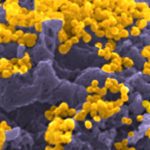Link to Pubmed [PMID] – 23103874
Nature 2012 Dec;492(7427):118-22
Human antibodies to human immunodeficiency virus-1 (HIV-1) can neutralize a broad range of viral isolates in vitro and protect non-human primates against infection. Previous work showed that antibodies exert selective pressure on the virus but escape variants emerge within a short period of time. However, these experiments were performed before the recent discovery of more potent anti-HIV-1 antibodies and their improvement by structure-based design. Here we re-examine passive antibody transfer as a therapeutic modality in HIV-1-infected humanized mice. Although HIV-1 can escape from antibody monotherapy, combinations of broadly neutralizing antibodies can effectively control HIV-1 infection and suppress viral load to levels below detection. Moreover, in contrast to antiretroviral therapy, the longer half-life of antibodies led to control of viraemia for an average of 60 days after cessation of therapy. Thus, combinations of potent monoclonal antibodies can effectively control HIV-1 replication in humanized mice, and should be re-examined as a therapeutic modality in HIV-1-infected individuals.

